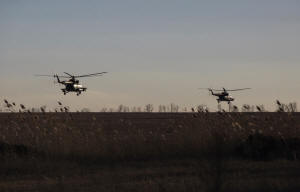Russians claim control over Bakhmut's east, Ukrainians defiant
 Send a link to a friend
Send a link to a friend
 [March 08, 2023]
By Olena Harmash [March 08, 2023]
By Olena Harmash
KYIV (Reuters) - The head of Russia's Wagner mercenary group said on
Wednesday his forces had taken full control of the eastern part of the
Ukrainian city of Bakhmut as one of the bloodiest battles of the
year-long war ground on amid the ruins.
If the claim is true, it would mean Russian forces control nearly half
the city in their costly push to secure their first big victory in
several months.
Ukrainian defenders remained defiant, however. Last week they appeared
to be preparing for a tactical retreat from Bakhmut, but military and
political leaders are now speaking of hanging on to positions and
inflicting as many casualties as possible on the Russian assault force.
In Stockholm, Ukraine's defence minister said Kyiv urgently needed huge
supplies of artillery shells to mount a general counter-offensive
against Russia's invasion army, urging EU members to support an Estonian
plan for joint procurement of munitions.
"We need to move forward as soon as possible," Oleksii Reznikov told
reporters before an EU defence ministers' meeting.

The General Staff of the Ukraine's Armed Forces said in its Wednesday
morning report: "The enemy, despite significant losses, ... continues to
storm the town of Bakhmut."
Wagner head Yevgeny Prigozhin said his fighters, who have been
spearheading the Russian campaign to seize Bakhmut, had now captured the
city's east.
"Everything east of the Bakhmutka River is completely under the control
of Wagner," Prigozhin said on Telegram.
The river bisects Bakhmut city, which sits on the edge of a swathe of
the Donetsk region that is already largely under Russian occupation. The
city centre is on the west side of the river.
Prigozhin has issued premature success claims before and Reuters was not
able to verify his latest one.
Ukrainian military statements said earlier there may be "conditions" in
Bakhmut for a Ukrainian offensive.
"The main task of our troops in Bakhmut is to grind the enemy's fighting
capability, to bleed their combat potential," Serhiy Cherevatyi, a
spokesperson for Ukraine's eastern military command, told public
television on Tuesday.
DEVASTATED CITIES
Russia, which claims to have annexed nearly 20% of Ukraine's territory,
has made progress in recent weeks around Bakhmut, but its winter
offensive has yielded no significant gains in assaults further north and
south.
It says that taking Bakhmut would be a step towards seizing the
industrial Donbas region, made up of Donetsk and Luhansk provinces.
Western analysts say Bakhmut has little strategic value.

But Kyiv says the losses suffered by Russia there could determine the
course of the war, with decisive battles expected when the weather is
better and Ukraine receives more military aid, including heavy battle
tanks.
Luhansk Governor Serhiy Haidai said in comments on Ukrainian television
that Russia's strategy in east Ukraine remained the same - to take the
remaining areas of Donetsk and Luhansk that it does not control.
[to top of second column]
|

Ukrainian Armed Forces helicopters fly
over a field outside the frontline town of Bakhmut, amid Russia's
attack on Ukraine, in Donetsk region, Ukraine March 5, 2023.
REUTERS/Anna Kudriavtseva

"As for tactics - they understand that they are not able to make any
rapid advance, so they have one tactic - they advance where they
can. If they see that there is any success somewhere, they throw all
the reserves into it," he said.
"So far, in the directions of Kreminna, Svatove and Bilohorivka
(all northwest of the regional capital Luhansk) they have had no
strategic successes and are making no progress."
The months of warfare in the east have been among the deadliest and
most destructive since Russia invaded in February last year, adding
Bakhmut's name to a list of devastated cities such as Mariupol,
Sievierodonetsk and Lysychansk.
A Ukrainian military drone showed the scale of destruction in
Bakhmut, filming apartment blocks on fire and smoke billowing from
residential areas.
Iryna Vereshchuk, a deputy Ukrainian premier, said fewer than 4,000
civilians - including 38 children - out of a pre-war population of
some 70,000 remained in the city, which is now largely in ruins
after months of bombardment.
"The situation in the city is difficult. The enemy actively storms
our positions, however they don't have any success and suffer
colossal losses," a Ukrainian border guard said in a video released
by the State Border Service.
"Probably out of spite, they tried to blow up two bridges. But we
still receive everything that we need. The city stands, because
Bakhmut was, is, and will be Ukraine. We’ll stay in touch."
The Ukrainian General Staff also said Russian forces made more than
30 unsuccessful attacks over the past day near Orikhovo-Vasylivka
alone, 20 km (12 miles) northwest of Bakhmut. They shelled the areas
around 10 settlements along the Bakhmut section of the front line,
it said.

MORE SHELLS
In Stockholm, EU defence ministers were meeting to discuss further
arms supplies to Kyiv. Shipments of battle tanks and artillery are
already in the pipeline but it could take months before they can be
put into action on the front lines.
Ukraine's Reznikov said Kyiv wanted 90,000 to 100,000 artillery
rounds per month. Ukraine is burning through shells faster than its
allies can make them.
He said he supported a proposal by Estonia for EU countries to club
together to buy 1 million 155-millimetre shells for Ukraine this
year at a cost of 4 billion euros ($4.22 billion).
German Defence Minister Boris Pistorius said it would take time for
industry to ramp up capacity to meet higher demand.
"We have to face the truth: Just because we all place more orders
does not mean there is more ammunition. It has to be produced before
it can be delivered," he said.
In other developments, German Defence Minister Boris Pistorius on
Wednesday warned against reaching premature conclusions on who was
responsible for blowing up the Nord Stream pipelines, suggesting the
attack last year could have been a "false flag" operation to blame
Ukraine.
Pistorius was speaking after a New York Times report, citing
intelligence reviewed by U.S. officials, said a pro-Ukrainian group
may be behind the blasts.
(Reporting by Reuters bureaux; Writing by Angus MacSwan, Editing by
Nick Macfie)
[© 2023 Thomson Reuters. All rights
reserved.]This material may not be published,
broadcast, rewritten or redistributed.
Thompson Reuters is solely responsible for this content. |